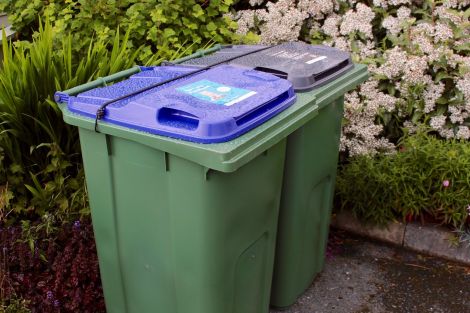News / Councillor Thomson busts recycling ‘myth’
A SHETLAND councillor has been speaking out in an attempt to bust an apparent myth that the isles’ new recycling regime is environmentally counterproductive.
As the last local authority in the country to do so, Shetland Islands Council is introducing a recycling scheme based on two wheelie bins which are being distributed to all households.
Islanders are required to set aside items like paper, cardboard, plastic bottles, cans and drink cartons, which were previously sent to landfill or incinerated, in a bid to boost the islands’ poor recycling rate of just 7.9 per cent (2016 figures).
The Scottish average is 42.8 per cent, which falls below the recycling rates in England, Wales and Northern Ireland, according to the investigative journalism platform The Ferret.
The collected materials will then being shipped to recycling plants on the UK mainland while waste is being imported to keep the incinerator, and hence the Lerwick district heating scheme, going.
This is being branded as “madness” by some local voices, while earlier this summer, the Scottish Mail on Sunday asked whether this was the “barmiest green energy scheme” around.
But chairman of the council’s environment and transportation committee, Ryan Thomson, said the new recycling scheme benefits Shetland both environmentally and financially.
“The claims that emissions involved in transporting waste would override any environmental benefit are false. Indeed, Zero Waste Scotland calculates that plastics from Shetland would need to be shipped around the world 15.6 times to override the emissions saved in recycling,” he said.
“For every tonne of plastic recycled rather than burned, 2.2 tonnes of carbon dioxide is saved from the atmosphere.”
Financially, he said, the scheme made a lot of sense as the SIC was going to pay less for disposing its rubbish while earning money from the materials that can be recycled.
Become a member of Shetland News
“Currently the SIC pays to dispose of household rubbish – a £45.15 per tonne gate fee at the energy recovery plant, or £135.10 per tonne if it’s going to landfill,” he said.
“Collected materials are valuable once separated, so if we recycle we get paid for the product rather than having to pay to dispose of it.”
And he added: “Other councils cannot recycle or landfill all of their waste – the leftover waste can be turned into something called refuse derived fuel (RDF). They will pay to ship RDF here and pay us to use our incinerator – again this will generate further income to the council.
“RDF has been tested at the energy recovery plant and can replace the recyclable materials we are removing from our black bag waste.
“Again – the environmental benefits of this entirely outweigh the transport emissions as explained above.”
Zero Waste Scotland is providing over £500,000 in funding towards the cost of introducing the recycling scheme to Shetland.
A sorting shed for handling recyclable materials being shipping south has just received planning permission and is expected to be operational by the turn of the year.
Become a member of Shetland News
Shetland News is asking its many readers to consider paying for membership to get additional features and services: -
- Remove non-local ads;
- Bookmark posts to read later;
- Exclusive curated weekly newsletter;
- Hide membership messages;
- Comments open for discussion.
If you appreciate what we do and feel strongly about impartial local journalism, then please become a member of Shetland News by either making a single payment, or setting up a monthly, quarterly or yearly subscription.





























































